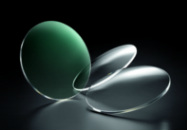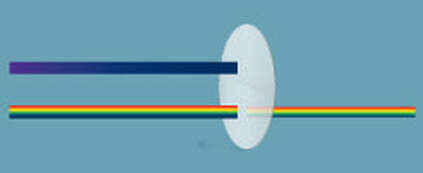Todays modern lenses are available in a myriad of materials and design options. From CR39 to extremely attractive and lightweight higher index resins. The choice of lens material & design offered will depend on a variety of factors including prescription, frame choice and the likely uses of your spectacles, so for the best advice call in to chat with one of our Dispensing Opticians.
CR39 Plastic 1.498This is the most basic lens material available. The name of this plastic resin comes from the abbreviation of "Columbia Resin #39" as it was the 39th formula used in it's development in 1940. It was not until 1947 that the first spectacle lenses were manufactured. In our onsite workshop, we stock a wide range of single vision powers meaning that it is possible to produce many spectacles within an hour.
|
Trivex 1.53Trivex is a relatively new lens material and as such there are a limited number of options available. It is currently the lightest lens material on offer and is incredibility impact resistant so it is an excellent choice for rimless frames and also for childrens eyewear. It is UV absorbent without further treatment and benefits from extremely good optical clarity.
|
Rodenstock PRO 410
The new high-tech material PRO410 protects against potentially harmful high-energy blue light and provides 100% UV protection (UVA/UVB). The incident light is filtered by the material PRO410 - light components with a wavelength of over 410 nm pass through the lens. These light components are important for vision and colour perception, as well as for undisturbed circadian rhythm (sleep-wake rhythm). Hence, the new material PRO410 ensures optimal protection and well-being.
UV and potentially harmful high-energy blue light with a wavelength up to 410 nm is filtered. Light required for biorhythms and other biological functions of the human body passes through the lens.
UV and potentially harmful high-energy blue light with a wavelength up to 410 nm is filtered. Light required for biorhythms and other biological functions of the human body passes through the lens.
The combination of the new high-tech material PRO410 and the premium Solitaire® Protect PRO 2 coating gives:
The perfect combination for optimal protection against light and supreme aesthetics.
|
|
Plastic Hi-Index 1.60 - 1.76Lenses which have a high refractive index are used in order to reduce the thickness and weight of lenses of stronger prescriptions. There are various options available which can reduce the thickness of lenses by between 28% & 50% making them lighter and cosmetically more appealling than the standard option. Usually they are supplied with reflection-free coatings as these denser materials are much more reflective.
New to the UK market is the introduction of the worlds first 1.76 index plastic by Japanese company Tokai Optical. |
Photochromic LensesThese lenses contain special molecules which change shape and give the appearance of the lens darkening when subjected to UV light. When the UV source is removed the lenses return to their clearer un-reacted state. The advantage of these lenses is that for outdoor use a seperate pair of sunglasses would be unnecessary; however, whilst technology is constantly improving, they do not change instantly. As they also do not work well behind windscreens, they are not the best choice of sunglass for driving.
|
Glass LensesThese days, there are few situations where a glass lens would be chosen in preference to plastics. They are much heavier by comparison and there is an obvious safety issue for day to day wear. Occasionally with some very extreme prescriptions, glass maybe the only alternative and there are some uses for glass as safety spectacles. Despite popular belief, the optical properties of CR39 & glass are very similar with the surface resiliance of a glass lens being the only real advantage.
|

